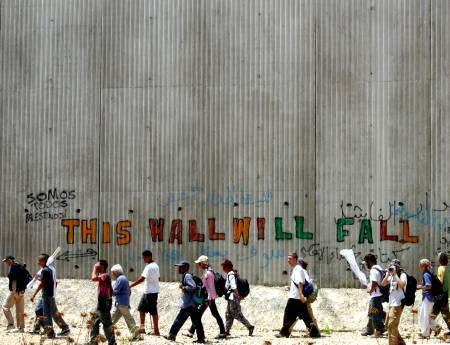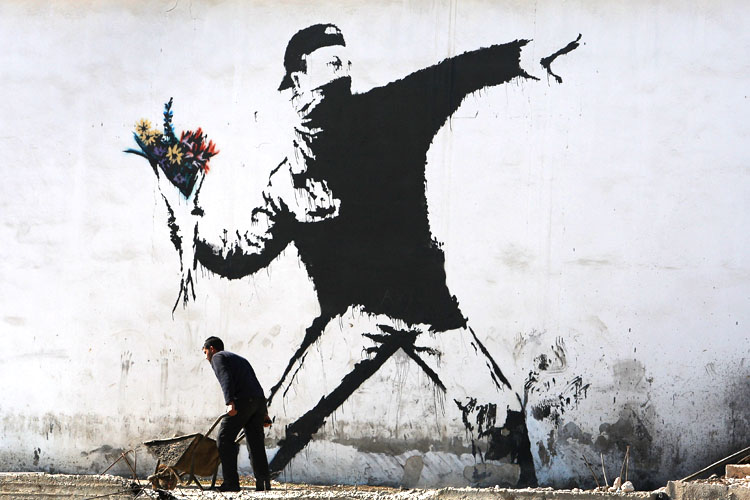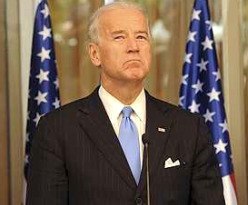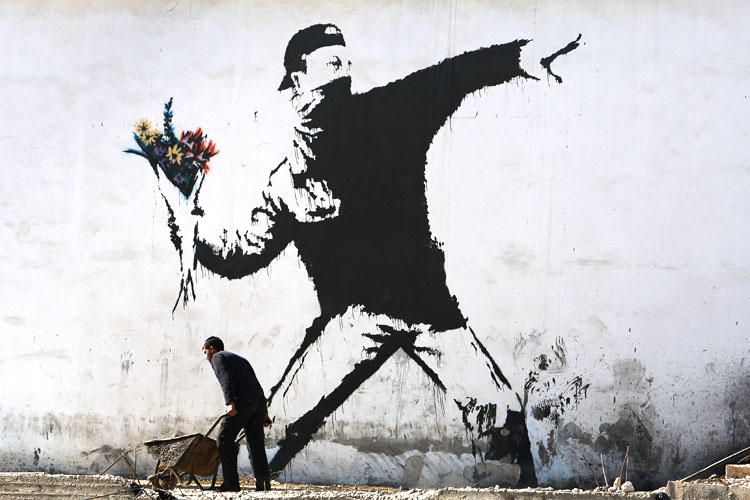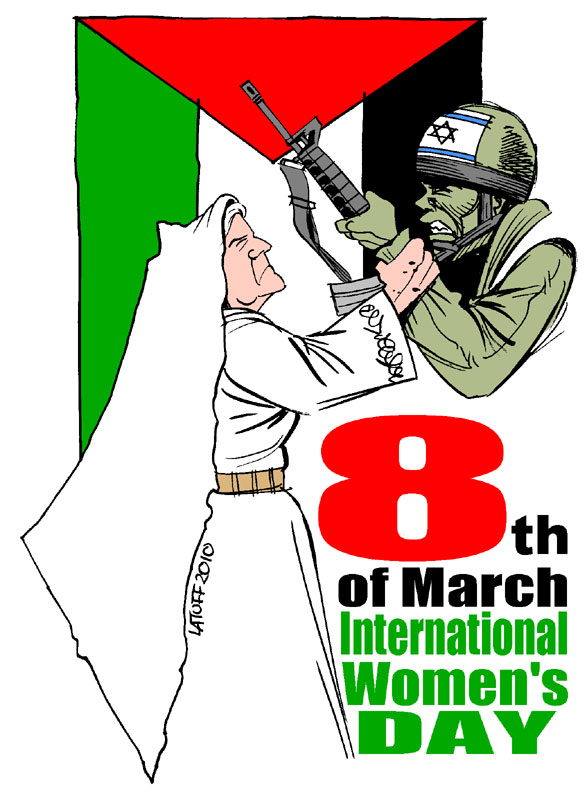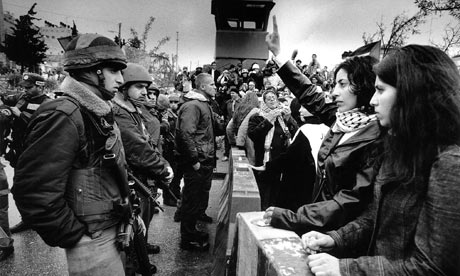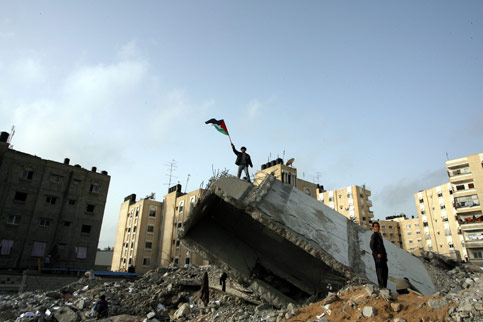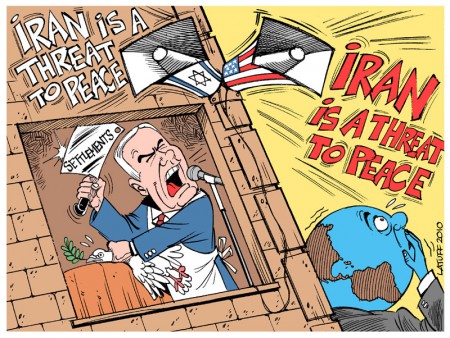
EDITOR: Jerusalem Comedy routine turns sour
While Netanyahu and Barak do all they can to derail and sabotage the ‘non-talks’, and continue to settle the Occupied Territories of Palestine, and the US mandarins are spinning about like headless chickens, the Palestinians are on the move. That is, not the bizarre and supine goverment in Ramallah, by people everywhere on the West Bank. It seems that Israel has played itself out of court, by being too smart by half, as usual. This will not end up like Netanyahu planned, it seems.
While it is true that audiences in the West forget and forgive (who now remembers the Dubai murder?) it seems that this time Israel has again overstepped the mark for oppressive regimes, and managed to affront quite a few, who understood the crude maneuver for what it was -a way to derail the talks, and to avert the ‘danger of peace’, which is the main danger faced by the mini-empire of occupation, settlements and oppression. There is also another group who does not forget in hurry – Palestinians and Arabs elsewhere, who are facing oppressive regimes on their own, and well understand the events despite the veneer put on them by the media.
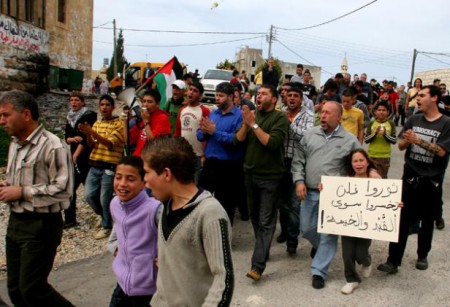
U.S. gave Israel green light for East Jerusalem construction: Haaretz
By Akiva Eldar
The apology offered by Prime Minister Benjamin Netanyahu and Interior Minister Eli Yishai recalls the joke about the servant who pinched the king’s bottom. En route to the gallows, the servant apologized: He thought it was the queen’s bottom.
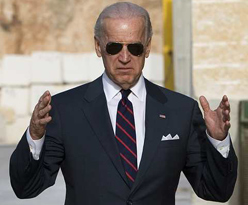
The statement issued by Netanyahu’s bureau said that in light of the ongoing dispute between Israel and the United States over construction in East Jerusalem, the plans for new housing in the Ramat Shlomo neighborhood should not have been approved this particular week. It also said the premier had ordered Yishai to draft procedures that would prevent a recurrence. In other words, Yishai is welcome to submit more plans for Jewish construction in East Jerusalem next week, when U.S. Vice President Joe Biden will no longer be here.
Based on Biden’s reaction, it seems that he (and, presumably, his boss) has decided that it is better to leave with a few sour grapes than to quarrel with the vineyard guard. In his speech at Tel Aviv University, he said he appreciated Netanyahu’s pledge that there would be no recurrence. But what exactly does that mean? That next time he comes, the Planning and Building Committee will be asked to defer discussion of similar plans until the honored guest has left?
With the media storm dying down, Netanyahu can breathe a sigh of relief.
In a sense, the uproar actually helped him: To wipe the spit off his face, Biden had to say it was only rain. Therefore, he lauded Netanyahu’s assertion that actual construction in Ramat Shlomo would begin only in another several years.
Thus Israel essentially received an American green light for approving even more building plans in East Jerusalem.
Biden might not know it, but the Palestinians certainly remember that this is exactly how East Jerusalem’s Har Homa neighborhood began: Then, too, Netanyahu persuaded the White House that construction would begin only in another several years.
When Biden arrived, the Arab League had just recommended that Palestinian Authority President Mahmoud Abbas accede to Washington’s proposal for indirect talks with Israel.
But instead of being able to leave with an announcement that the talks have officially begun, Biden is leaving with the news that the Arab League has suspended its recommendation.
Netanyahu can thus hope that the Ramat Shlomo imbroglio has deferred the moment of truth when he must reveal his interpretation of “two states for two peoples.” And just in case anyone failed to realize how impartial a mediator the U.S. is, Biden said in his Tel Aviv speech that the U.S. has “no better friend” than Israel.
For Netanyahu, the cherry on top was that the onus for advancing the negotiations has now been put on the Arab states – just two weeks before the Arab League summit in Tripoli, where the league’s 2002 peace initiative will again be up for discussion. For months, U.S. President Barack Obama has been trying to persuade Arab leaders not to disconnect this important initiative from life support. His argument is that nothing would make Iranian President Mahmoud Ahmadinejad happier than a final blow-up of the peace process and the outbreak of a third intifada. And his joy would be redoubled if the fire started in Jerusalem.
But while the U.S. may be papering over the rift for now, Western diplomats said the bill will come due once the talks with the PA begin (assuming they do). The U.S. has already said it will submit bridging proposals of its own during these talks, and its anger and frustration over the Ramat Shlomo incident are likely to make it far more sympathetic to the Palestinians’ positions, the diplomats said.
For instance, Netanyahu wants security issues to top the talks’ agenda, an Israeli source said. But the Palestinians want the first issue to be borders, including in Jerusalem.
And the European Union, which had planned to upgrade various agreements with Israel this week in honor of the resumed talks, has now postponed the upgrade until it becomes clear whether the talks will in fact take place.
IDF seals off West Bank amid Jerusalem tensions: Haaretz
Defense Minister Ehud Barak Thursday ordered the Israel Defense Forces to impose a general closure on the West Bank, preventing Palestinians from entering Israel.
Barak said only patients, medical staff, religious workers and teachers with special permits to pass through army roadblocks on key access roads.
On Friday, Palestinian youths attempted to break through the blockade the police set up at the entrance to the Temple Mount. Police forces managed to prevent the youths from entering, and one Palestinian was arrested after he assaulted one of the police officers.
“The IDF will continue to operate in order to protect the citizens of Israel while maintaining the quality of life of the Palestinian population in the area,” it said in a statement.
The move was made in anticipation of renewed Jerusalem riots in response to a recent government decision to expand settlements in East Jerusalem.
The West Bank will be sealed off for 48 hours, and the closure will be lifted on Saturday at midnight.
Police say only men over 50 will be allowed to pray Friday at the Temple Mount, while no limitations were placed on women.
On Tuesday, the Interior Ministry announced its decision to authorize 1,600 more housing units in the ultra-Orthodox neighborhood of Ramat Shlomo in East Jerusalem. The announcement created a diplomatic uproar and received stark condemnation from visiting United States Vice President Joe Biden.
There have been clashes after Friday prayers at mosques in Jerusalem and
elsewhere in recent weeks, sparked by deadlock in peace talks and Israel’s inclusion of two West Bank shrines on a list of national heritage sites.
On Friday last week, youths hurled rocks from the Temple Mount, on which the al-Aqsa Mosque stands, at Jewish worshippers praying at the Wailing Wall beneath the elevated compound.
Police responded by storming the open-air plateau to disperse the protesting crowd and some 60 Palestinians were treated for the effects of teargas, while 15 policemen were lightly wounded by stones.
Several Palestinians have been badly wounded and dozens of protesters and
Israeli policemen have suffered light injuries.
The closure began at midnight Thursday and will end at midnight Saturday
Sleepless in Jerusalem and Gaza 7
Ashira covers a non-violent protest in Sheikh Garrah’s district with Palestinians, peace activists and Israelis in the march.
Nagham meets a friend in Gaza Strip and have a little talk with people whose house was destroyed in the last war.
Sleepless in Jerusalem and Gaza 8
Day 8: Ala’ goes to Ramallah, the most lively city in Palestine, for shopping. Goods are cheaper and the city is enjoyable.
Nagham head to the French Cultural Center for an art gallery on Gaza. She has an interview with Jean Mathiot, the Director of the French Cultural center.
US / Israel: The Special Relationship: Press TV
An Entangled Alliance
Interview With Jeff Gates By Press TV
To restore national security requires a reappraisal of the U.S.-Israeli “special relationship.”
Jeff Gates is A widely acclaimed author, attorney, investment banker, educator and consultant to government, corporate and union leaders worldwide.
Why is the EU failing to comply with its international law obligations over Israel?: Times online
Michael Mansfield, QC
If you lived on a street where a neighbour frequently and flagrantly broke the law, you would want something done about it, especially if that neighbour took part of your garden, replaced the fence with a 30ft wall, cut down your trees and redirected your water supply.
Suppose the authorities to whom you complained merely denounced the illegalities and took no action? You might think that this situation is inconceivable. But that is precisely what has been happening to the Palestinians for the best part of 60 years.
On July 9, 2004, the International Court of Justice in The Hague (ICJ) produced a strong advisory opinion on the legal consequences of the construction of a wall in the occupied territories.
Fourteen of 15 judges agreed the core findings: that the construction was contrary to international law, both human rights and humanitarian; that it should be dismantled with reparations being made for all damage caused. This was adopted by a UN General Assembly resolution on July 20, 2004.
This resolution, like so many before it concerning violations perpetrated by Israel, was fundamentally ignored. The ICJ had not only specified the obligations owed by Israel under international law but also spelt out very clearly the obligations incumbent on third-party states to ensure that the core values or peremptory norms — such as the right to self-determination — are upheld by those states that break them. This is a matter of common sense and ordinary reason; for, were it to be otherwise, the rule of law and the authority of international justice would be completely undermined.
It was in this context that the Russell Tribunal was reconvened in Barcelona on March 1 to 3 to examine the legal responsibility for violations in the Palestinian Territories. Four more international sessions are planned.
The tribunal has an illustrious history with its origins in the Bertrand Russell Peace Foundation launched in 1963. The first tribunal concerned the war in Vietnam, and led to citizens’ commissions of inquiry held in several American cities. A second tribunal was established to investigate human rights violations in South America in 1974-75.
These are tribunals of conscience, created in response to the demands of citizens in many countries who feel that perpetrators must be held to account and that states cannot be allowed to act with impunity; which is often the result of inaction and complicity by others.
The first session examined the responsibility of the European Union and its member states. The hearings dealt with six topics: self-determination; the annexation of East Jerusalem; settlements and the plundering of natural resources; the EU Israel Association agreement; the Gaza blockade/Operation Cast Lead; and the wall.
Proceedings were opened by Stéphane Hessel, a co-author of the Universal Declaration of Human Rights, followed by 27 witnesses with a range of expertise and experience (lawyers, academics, aid workers, human rights advisers, members of the European and British parliaments and a military adviser).
Israel’s violations are well known and well documented through to the Goldstone report on the invasion of Gaza in early 2009 and were summarised in the tribunal’s report under ten separate headings. The tribunal determined that a form of apartheid is being practised. The EU and its member states were found to have transgressed the EU Treaty itself as well as international obligations under the UN Charter and the 1966 Covenant on Civil and Political Rights.
The real question, however, is not just inaction but positive action undertaken by Europe that supports the illegality. This can be exemplified by the export of weapons and components; the trade in produce from settlements in the occupied territories and above all the multibillion EU Israel Association agreement that confers benefits on Israel. The EU is the third most important trading partner for Israel and the EU Parliament has passed a resolution requiring the suspension of the association agreement, but like so much else this has not been implemented.
It was obvious to the tribunal, therefore, that the EU may not be prepared to comply with international law. In these circumstances it is necessary for concerned citizens to examine ways in which accountability may be effected. There are a number of legal avenues that can be pursued against individual European governments and their agencies, and individual private companies that maintain the regime of illegality. Additionally Israeli perpetrators of war crimes are susceptible to universal jurisdiction and are liable to be arrested should they travel to Europe.
So far the exercise of this power has not been overwhelmingly embraced by European states; instead it has been left to the endeavours of committed individuals on behalf of the victims and their families in the Palestinian Territories.
The author, a QC, was one of the eight member international jury panel of the RTP. See their full report at www.russelltribunalonpalestine.com
Israel’s unfair ‘law of return‘: The Guardian CiF
While British Jews are offered property in the West Bank, Palestinian refugees are still denied the right to return
Abe Hayeem
The yearly drive to encourage British Jews to emigrate to Israel culminated last weekend in the Israel Property Exhibition in a north London synagogue. “Make your dream come true with your own home or investment in Israel,” it urged. Although most of the property for sale is in Israel itself, some is in the occupied Palestinian territories. The Jewish Agency also placed ads in Jewish News and the Jewish Chronicle, which last month included a glossy pamphlet with programmes to “ease and speed up the process of immigration”. Free flights and citizenship within 24 hours were on offer, together with generous financial and social benefits and tax exemptions.
The “community aliyah programme” shown in the pamphlet calls on UK Jews to “start a new life in a vibrant Israeli city” but of these, only three – Haifa, Modiin and Yad Binyamin – are within Israel proper. The other five are Jerusalem (evidently including the illegally annexed eastern part); Ariel, “located in the centre of Israel” (sic); Maaleh Adumim; Efrat (the capital of Gush Etzion); and the Gush Etzion bloc as a whole, which spreads south of Jerusalem into the heart of the West Bank. On YouTube, a Jewish Agency video shows a British family leaving their house in the suburbs, piling into their car and setting the sat-nav to “Home”, eventually being raucously welcomed to Israel.
This drive to increase Jewish emigration has accelerated in recent years. One organisations, Nefesh B’Nefesh (“Soul by Soul”), says its core mission “is to revitalise aliyah [migration to Israel] and to substantially increase the number of future olim by removing the financial, professional and logistical obstacles that prevent many individuals from actualising their dreams”. It adds: “We aim to educate and inspire the Jews of the diaspora as to the centrality of the Jewish state to the Jewish people and its desirability as a Jewish home.”
The Jewish Agency is part of the parent World Zionist Organisation. It promotes and manages aliyah to Israel, purchases land in Israel and the West Bank through the Jewish National Fund, and plays a key role in establishing and funding the settlements there. The pamphlet shows the increasing aliyah figures from the UK (853 in 2009, a 37% increase from 2008). In effect, UK citizens are being encouraged to live in Israel and also in illegally-occupied East Jerusalem and the West Bank, whose settlements have been established and enlarged in direct violation of international law.
Although Israel is most keen to welcome Anglo-Saxon Jews from the US and UK, Jews from “lost tribes” such as the Bnei Menashe (Children of Menasseh) in India have also been fast-tracked in to subvert the settlement freeze. Even Peruvian Indians were brought in (provided they converted immediately to Judaism) and sent to West Bank settlements. Jewish people throughout the world have an automatic right to Israeli citizenship under Israel’s “law of return”, though many in the US, UK and Australia now are rejecting this right.
Today there are more than seven million Palestinian refugees around the world. Israel denies their right to return to their homes and land – a right recognised by UN resolution 194, the Geneva convention, and the universal declaration of human rights. Further, “an occupier may not forcibly deport protected persons… or transfer parts of its own civilian population into occupied territory” (article 49).
The Foreign Office emphasises that the UK’s “policy on settlements in the West Bank and East Jerusalem is absolutely clear: Israeli settlements activity is not only illegal under international law, it is also in contravention of Israel’s obligations under the Road Map to Peace and detrimental to the peace process. The prime minister made this point most recently in a letter to Prime Minister Netanyahu of 5 January.”
The Israeli government continues to expand these settlements and encourage immigration in order to consolidate its hold on the occupied territories. The new Jewish-only settlement towns being built by the Jewish National Fund within Israel, in the Negev and Galilee, also continue Palestinian dispossession, by displacing Bedouin in “unrecognised villages”. While Palestinians are being continuously dispossessed, imprisoned in enclaves, and prevented from building to house their families on their own land, Jewish people from any part of the world can be housed anywhere they choose within Israel and West Bank. Precious water resources are used lavishly in the settlements, while drastically limiting Palestinians’ access. Use of the super-highways linking settlements to Israeli cities is denied to Palestinians, and sewage from the settlements is discharged into Palestinian villages and agricultural areas. The settlement freeze is a joke, and is ignored by Israel. It is more a settlement frenzy.
So far, the British government, while issuing protests to the Israeli government, has not taken proper measures, together with the Quartet, that would stop the settlement construction. Arguably, British citizens who settle in Israel may be accessories to a crime if they move to these illegal settlements in the occupied West Bank, contravening the 1977 additional protocol and the International Criminal Court Act 2001, which the UK has ratified. Unless Britain acts firmly to end Israel’s impunity to international law and agreements, hopes of establishing a lasting and just solution for peace in the Middle East will be indefinitely delayed.
UN humanitarian chief criticises Israel over Gaza: BBC
Israel’s blockade of Gaza has not weakened Hamas, Mr Holmes said
The UN’s top humanitarian official, John Holmes, has criticised Israel for linking the 2006 capture of an Israeli soldier to its blockade of Gaza.
Mr Holmes also said Israeli actions in East Jerusalem and the West Bank, including expanding settlements, was counter to the peace process.
He urged a relaxation of the blockade, warning Gaza was “de-developing”.
It came as Israel ordered the army to seal off the West Bank for 48 hours until midnight on Saturday.
An army spokesman said the move had been made because of heightened tensions in Jerusalem.
Meanwhile, Israeli aircraft hit two targets in southern Gaza Strip early on Friday. Witnesses reported seeing several injured people.
The developments follow a visit to Israel and the West Bank by US Vice-President Joe Biden, during which the US and Palestinians criticised Israel’s plans to build more Jewish homes in the Arab east of the city.
‘Gangster economy’
The Israeli soldier, Gilad Shalit, was captured by Palestinian militants nearly four years ago near the border with Gaza.
Mr Holmes, of the UN Office for the Co-ordination of Humanitarian Affairs, was speaking at the UN after visiting Israel and the Palestinian territories earlier this month.
“Obviously we’ve called for the release of Cpl Shalit, and that he should be treated in accordance to the Geneva conventions,” Mr Holmes said.
“But the link between that and the fate of 1.5 million Palestinians in Gaza does not seem to us a reasonable one.”
He said the blockade of Gaza had not weakened Hamas, the militant Islamist movement which controls the territory.
Mr Holmes told journalists there had been some progress: the Israelis had allowed into Gaza goods such as glass to fix broken windows.
But, he said, in general Gaza was being pushed backwards, or “de-developing”, because it was not possible to repair war damage and revive the economy.
Mr Holmes said the situation in Gaza was so bad that even though smuggling tunnels to Egypt were fostering a “gangster economy”, the situation would become unsustainable if they were blocked.
The tunnels are a conduit for badly needed commercial goods, including food and medicine, but are also widely believed to be used for smuggling cash and weapons to Hamas.
Egypt is reinforcing its Gaza border barrier with underground metal plates in an attempt to block the tunnels.
Mr Holmes spoke as Mr Biden was winding down his trip to the Middle East, the highest ranking Obama administration official yet to go to Israel and the West Bank.
‘No better friend’
On Tuesday, the Israeli interior ministry said that the Jerusalem authorities had approved the expansion of Jewish homes in East Jerusalem.
Mr Biden said the decision “undermined the trust required for productive negotiations” and warranted his unequivocal condemnation.
But he also said the United States had “no better friend than Israel” and urged peace talks to resume without delay.
Close to 500,000 Jews live in more than 100 settlements built since Israel’s 1967 occupation of the West Bank and East Jerusalem.
They are illegal under international law, although Israel disputes this.
‘Abbas seeks U.S. pledge to freeze East Jerusalem construction’: Haaretz
Palestinian Authority President Mahmoud Abbas on Thursday sought guarantees from Washington that it would pressure Israel to cancel its plan for 1,600 new housing units in East Jerusalem, Palestinian media outlets reported.
U.S. Mideast envoy George Mitchell spoke with Abbas late Thursday and urged him not to walk away from indirect peace negotiations with Israel, a senior Palestinian official quoted in the reports said.
Prime Minister Benjamin Netanyahu on Thursday said he believes indirect talks with the PA will continue as planned early next week despite the crisis with the U.S. over the plan for new housing in East Jerusalem and the protests by the Palestinian Authority and Arab world.
“The crisis is behind us,” sources in the Prime Minister’s Bureau. They said proof was the invitation to Netanyahu by U.S. Vice President Joe Biden to meet in Washington in 10 days while Netanyahu visits a meeting of the AIPAC lobby group.
Nonetheless, senior American officials said that even though the crisis is over publicly, it will take time to restore trust between the two sides.
The future of the negotiations was raised during a telephone conversation between Biden and Netanyahu Thursday. Biden also discussed the issue with Palestinian President Mahmoud Abbas.
Biden told the Palestinian leader that the United States opposes settlement construction but is determined to resume talks. He stressed to Abbas that Washington would disapprove of a delay in taking the talks forward.
State Department spokesman P.J. Crowley on Thursday also said the U.S. believes indirect peace talks will go ahead as scheduled, casting doubt over comments by Arab League chief Amr Moussa on Wednesday who said Abbas had decided to scrap the talks to protest Israel’s plan.
“I don’t think that that report that’s been circulating for the last 24 hours is accurate,” Crowley said. “As far as I know, we are still moving forward. We have not heard from the Palestinians that they have pulled out.”
He said that Mitchell and Assistant Secretary of State Jeffrey Feltman had been telephoning regional leaders to assess the situation following Israel’s announcement, but that Mitchell still planned to return to the region next week with a view to launching the talks.
“George Mitchell is planning to be in the region next week and for further discussions on these issues. We remain committed to the process that is under way,” Crowley said.
How Bibi lost a best friend: The Guardian
Netanyahu needs all the support he can get. But he still turned Biden’s visit into a diplomatic fiasco
Aluf Benn
Israel’s prime minister, Binyamin Netanyahu, has a bad habit: when things appear to be moving in the right direction for him, he stumbles upon some stupid political landmine, raising doubts about his leadership and credibility.A series of blunders had ruined his first term in the 1990s, and on his way back to power Netanyahu promised that he had changed. For a year, he stayed away from trouble, avoiding unscripted public remarks, giving no interviews, and being attentive to other politicians’ needs and interests. But this week, he did it again, ruining the visit of American vice president Joe Biden with an official announcement of a plan to build 1,600 new housing units in Ramat Shlomo, a Jewish neighbourhood of East Jerusalem – despite a well-known American opposition to Israeli settlement expansion. Netanyahu apparently didn’t know in advance about the interior ministry’s decision, taken by mid-level planning and zoning bureaucrats. But it was according to his government’s policy, and he should have and could have taken steps to avoid such unpleasant surprises. His failure to do so portrays him as a hopeless schlemiel, just like “old Bibi” from the previous term.
Biden’s trip was meant to mark a new chapter in the cool relationship between the Obama administration and Israel. Mindful of its political trouble at home in view of the midterm elections, and worried about an Israeli attack on Iran’s nuclear facilities, the White House dispatched the veep – known to be Netanyahu’s best friend in Washington – to plead Barack Obama’s case to the Israeli leadership and public. Biden’s trip coincided with the announcement of indirect Israeli-Palestinian peace negotiations, to give the battered administration a diplomatic success.
The Israeli interior ministry announcement, on Tuesday afternoon, put Biden in the worst possible position: rather than visit the Middle East as an honest peacebroker, he appeared as Israel’s patsy. And not only Biden: Mahmoud Abbas, the Palestinian leader, agreed to resume talks with Netanyahu despite Israel’s refusal to hold off construction in East Jerusalem. The new project threatened to show Abbas as Israel’s collaborator.
Previous prime ministers built more than Netanyahu in East Jerusalem, but they were careful to tie it in with positive developments in the peace process to avoid American anger. Lacking peace negotiations, Netanyahu’s rightwing coalition could not enjoy the American blind eye like its predecessors. Time and again in the past year there were diplomatic clashes over Israeli plans to settle Jews in Arab neighbourhoods, to build new homes for Jews, or to demolish Palestinian homes in East Jerusalem. Each time Netanyahu argued that he was not in the loop, but backed the decisions. His coalition partner Eli Yishai, the interior minister and leader of the rightwing Shas party, has made the settling of more Jews in East Jerusalem his cause celebre – to prevent a future partition of the city, and to deliver cheap housing to his ultra-Orthodox constituents.
In November the Americans tacitly agreed to the exemption of East Jerusalem – the most contested spot in the Holy Land conflict – from the settlement freeze announced by Netanyahu. But they expected not to be publicly embarrassed. When Israel couldn’t keep the deal, snubbing its senior American guest, the administration exploded. Biden called Obama, who told him to condemn the Israeli decision in the strongest terms – an unprecedented step in a high-level visit. Netanyahu apologised for the timing, and told Biden that the project in question will be built only “within several years”. The vice president accepted the apology, and delivered a staunchly pro-Israel speech at Tel Aviv University, praising “my close personal friend” Netanyahu. The Palestinians were less satisfied, withdrawing their agreement to renew talks.
Netanyahu’s constant zigzagging between his rightwing ideology and political partners and his craving for American support has turned the vice president’s visit into a diplomatic fiasco. Ultimately Netanyahu could not please both sides without paying a price. Biden’s face-saving remarks aside, “Bibi” is left with no friends in America’s highest echelons – when he needs all the support he can get vis a vis Iran’s threats and the Palestinians’ quest for independence. America will not abandon Israel, but its patience for its leader is running out.
West Bank rises up in a new ‘white’ intifada: The Independent
As Israel cracks down harshly on unarmed protesters, Donald Macintyre meets one Palestinian family whose teenage son has paid a heavy price
Friday, 12 March 2010
Asdal found his son, 14, on the road from their village of Beit Rima and ordered him into the car. “I told him: ‘You shouldn’t go, you’re too young.’ He told me: ‘I want to resist.’ I said: ‘Do you want me to see you on TV?'” But when Asdal stopped at a local garage and went in to talk to the mechanic, Ehab made his escape.
A few hours later he was unconscious in intensive care in Ramallah’s main hospital, a rubber-coated steel bullet having penetrated his skull. He had been standing among a crowd of youths, well inside the nearby village of Nabi Saleh, on a hillside carpeted with the first daisies and wild flowers of spring. Many of the youths were throwing stones at an unfinished house 25 metres away which had been occupied by armed Israeli Border Police some 15 minutes earlier. Shortly after 2.30pm a shot rang out, probably from the window, and Ehab dropped face down on the ground before being carried vomiting and bleeding from the wound above his right eye by four older men to relative safety back up the hill.
Even if freshly promised “proximity talks” between Israelis and Palestinians get under way, they are unlikely to halt the weekly protests that will take place after noon prayers today in some villages and tomorrow in others. The Palestinian Authority did not start the weekly protests that have now spread to more than half a dozen West Bank villages. And it is not leading them. But a supportive Palestinian cabinet statement appeared to adopt their model last month, applauding that: “Peaceful and popular efforts have regained international recognition of the just Palestinian cause and revealed the void Israeli excuses for the construction of settlements and the wall.”
For something is happening in these villages nestling among the rocky hills and olive groves between Ramallah and Nablus. The Israeli military does not accept the classification of the protests as non-violent; most usually end in confrontations between stone-throwing Palestinian youths and armed police and troops. But for the six years of such protests none of the Palestinians, in contrast to the security forces, have carried weapons. If these are the first tentative stirrings of a new uprising, and it is doubtful they can be described as that yet, then they are closer to the beginnings in 1987 of the first intifada, the so-called “war of stones”, than the second, with its bloody record of suicide bombings between 2000 and around 2005. Some commentators have dubbed the protests – and the apparent endorsement of them by the internationally respected Palestinian Prime Minister Salam Fayyad – as the “white” intifada.
Either way the protests, and the Palestinian Authority’s refusal to condemn them, have provoked a strong reaction from Israel’s security establishment. The Israeli newspaper Haaretz reported this week that Israel had warned the PA that if it did not “contain” the protests it would lose co-operation with Israel and there would be more arrests within the West Bank. An unnamed Israeli security official was earlier quoted in the same paper as having told diplomats that the protests constituted an “existential” threat to Israel.
Except for the 10 real injuries (eight to demonstrators and two to photographers), Nabi Saleh, where the villagers all belong to one clan, the Tamimis, last Friday had a flavour of Kabuki about it with Palestinians, supporting international and Israeli activists, and security forces all playing their part. The march of perhaps 100 men, children and a few women started in bright sunshine from the middle of the village. They began their descent along the main street chanting slogans like “National Unity: Fatah, Hamas, PFLP”. They followed the road round to the left, past the petrol station and were still a good 800 metres from the main road (Route 465) separating Nabi Saleh from the Israeli settlement of Halamish when the first tear gas canisters – along, say the protesters, with rubber bullets – were fired by the Israeli forces who had long taken up a position on a hilltop to the right. Some marchers scrambled down the hillside to the right, others retreated back towards the village, while others continued to move forward.
There was perhaps an hour of cat-and-mouse between the Tamimi youths and the Israeli forces controlling the exits from Nabi Saleh, the former throwing stones that fell short of any target and the latter firing rubber bullets and tear gas canisters (aluminium and rubber) that hit and injured a few protesters before the forces began to advance into the village itself. Three Jeeps advanced slowly up the road behind a white truck carrying a water cannon spraying “skunk”, a foul-smelling substance that leaves its odour for a week in the clothes of anyone who comes into direct contact with it. Taking refuge with perhaps a dozen protesters in the back room of the petrol station you could hear the loud explosion of a stun grenade – and the firing of tear gas and rubber bullets to cover the front Jeep as it was pelted with stones – before it began to move slowly back down the road again.
It seemed all over. But then the forces took over two houses, one the green building from which Ehab Barghouti, still in a coma yesterday, was shot. Pictures taken by The Independent from earlier in the protest show him hanging back from the front lines. But once the forces were inside the house, he was within range and in real danger. According to the Israeli human rights agency B’tselem, the regulation minimum range for firing rubber bullets is 40 metres and such bullets must be fired only at legs and not fired at children. Secondly, it is far from clear why the security forces occupied the house at all. According to Ramzi Tamimi, 33, one of the men who took the inert Ehab back up the hill: “As long as the soldiers stay away from the village and stay at the entrances, nothing happens. They deliberately come to make friction with us.” And beyond this is the fact that the entire protest took place on Palestinian land, land that if the putative peace talks ever had an outcome, would be part of a Palestinian state. For the stated, and of course never reached, destination of the march was a spring a few metres on the other side of Route 465, on what had long been Tamimi land. But the Halamish residents now control the land – and the spring – to the extent that when the villagers tried to cultivate their olive trees last November, they say they were driven away by armed, stone-throwing settlers.
The military says that “rock-throwing is considered a serious offence, placing others at significant risk and endangering both public and regional security.” But in Nabi Saleh the protesters were still marching peacefully, well within the village, and certainly not throwing stones when the military started firing tear gas.
At times the Israeli military has been deploying more lethal ammunition. The more famous and longer-running protests against the separation barrier have been at Nilin and Bil’in (where the IDF has finally decided to modify the route of the barrier so it will swallow up less of the villagers’ land, two-and-a-half years after a court order to do so). At both it has fired .22 live ammunition and high-velocity tear gas projectiles which are intended by their US manufacturers to be used to penetrate walls rather than against open-air crowds. It was one of these that severely wounded the US activist Tristan Anderson in the forehead in Nilin in March 2009 and has left him, after months in an Israeli hospital, with permanent brain damage. Another killed a prominent Bil’in protester Bassem abu Rahmah a month later.
According to the Popular Struggle Co-ordination committee, a loose body linking the local protest organisers, the .22 live bullets – which were proscribed for crowd-control by the military Advocate General in 2001 but reintroduced Operation Cast Lead in Gaza – have killed one demonstrator and injured 28 in Nilin alone since January last year.
Then there are the scores of arrests, frequently at night, including five in Nabi Saleh two days before last Friday’s demo. The arrests – including 112 in Bil’in alone since May 2008 – have worried European diplomats enough for them to form a rota to monitor the military court in Ofer where most of the detainees appear. One day last week – in the additional presence of an official from the US Consulate General – one of the Bil’in protest leaders, Abdullah Abu Rahmah, 39, who has been in military detention since December, was remanded again on a series of charges including a bizarre one of illegal arms possession; the indictment relates to Mr Abu Rahmah’s collection of spent tear gas canisters for an exhibition. As his Israeli lawyer Gaby Lasky told the court, her client was in no different a position from the police in the Negev border town of Sderot who have a collection of exploded Qassam rockets fired from Gaza to show visitors. “Because they are spent, they cannot be addressed as illegal arms,” she patiently explained to the military judge. The case continues.
The military has also sought to move against another notable aspect of the protests, the supportive presence of the left-wing Israeli activists who now regularly join them. The registration numbers of cars entering the West Bank through various checkpoints are checked against those of known Israeli participants. Among the 15 Israelis taking part in Nabi Saleh last week was Jonathan Pollak, a 28-year-old from Anarchists Against the Wall who is media co-ordinator on the joint committee.
For Ayed Morrar, a true Palestinian veteran of unarmed protest in the West Bank, the presence of Israelis is highly positive. “It’s good for our people, and good for them,” he says. Mr Morrar (who was injured by rubber bullets when he took part in the first demonstration in Nabi Saleh in January) is a popular leader in Budrus, where the villagers managed to change the route of the barrier at a time when suicide bombing was at its height and popular unarmed protest much criticised by Palestinian militants. Mr Morrar has spent six years in an Israeli prison as a Fatah activist (even though he never participated in armed violence) but now charges both Fatah and Hamas with being more interested in the sometimes bloody rivalry with each other than the national cause. His credo is to “apply all the sources of pressure on the occupation except killing. It is forbidden to decide to kill, to try to kill or to kill.” Arguing the Palestinians needs the international community on its side, he adds: “We want to show we are not against Jews, not against Israelis. We are against the occupation.”
EDITOR: The Army which Fights Children
The largest daily in Israel, Yediot Ahronot, has published the witness’ full testimony at the trial of a number IOF soldiers, earlier this week. It is makes for just amazing reading. And again: An army fighting against children, has already lost!
Child’s testimony incriminates soldiers: Ynet
Indictments issued Thursday against two soldiers who fought in Operation Cast Lead for allegedly forcing child to open bags suspected of being booby trapped. Ynet reveals full testimony of child, Majd that lays out alleged events of that day.
The war through the eyes of a nine-year-old boy
Anat Shalev
“I thought they would kill me. I became very scared and wet my pants. I could not shout or say anything because I was too afraid… He pushed me towards the small corridor in front of the bathrooms. He began shouting at me and speaking a language I did not understand… There were two bags in front of me. I grabbed the first one as he stood one and a half meters away. I opened the bag as he pointed his weapon directly at me. I emptied the bag on the floor. It contained money and papers. I looked at him and he was laughing. I grabbed the second bag to open it but I could not. I tried many times but it was useless, so he shouted at me. He grabbed my hair and slapped me very hard across the face.”
Witness: Majd R., a Palestinian boy, 9 years old
On this morning, IDF soldiers stormed the ground floor of a residential building in the neighborhood, while firing live ammunition. The soldiers separated the men from the women and children and ordered the men to strip before leading them one by one outside the building. A soldier approached Majd, who was hiding behind his mother in fear – and motioned for him to step forward.
What took place from here is the basis for an indictment issued against two Givati soldiers for overstepping their authority to the point of endangering life or health and unfit behavior. The soldiers, according to the indictment issued by the Military Prosecutor, asked Majd to open bags suspected of being booby trapped.
This is the second indictment filed against soldiers for their conduct during Operation Cast Lead, and additional indictments, much more serious, are already underway.
Investigation of this incident was initiated in June 2009 after the IDF was made aware of it by the UN Special Representative for Children and Armed Conflict and by the Israeli branch of Defense for Children International. Members of the organization were the ones who took the child’s testimony on March 30, 2009.
That testimony is printed here in near entirety.
“On the night of January 14, the bombing increased and explosions were heard every few minutes. So, we decided, my family and I, to go down to the ground floor where we stored water tanks. There, my brother said, it would safer for all of us. We were 40 people in the storage room with all the neighbors – men, women, and children.”
“At 5:00 am, I heard doors being broken. I heard heavy fire and bullets entered the windows of the warehouse. We had no electricity; the only light came from my brother N.’s torch that was placed on a concrete pillar inside the warehouse, and our vision was limited.
“Around 40 people were inside. Everybody was standing because there was no place to sit. We stood for about 10 minutes, during which the sound of explosions grew bigger. We heard Israeli soldiers shouting nearby, and the sound of gunfire entering the warehouse. I then heard the door of the warehouse being broken and Israeli soldiers shouting in a language that I later learned was Hebrew.
“The soldiers entered the warehouse firing everywhere. I saw small red lights moving everywhere inside the warehouse. I saw the shadows of around 30 soldiers on the wall in front of us. At this point, A. S. shouted at us “Say katan…katan; a word in Hebrew meaning small.” He was telling everyone, including the children, to say this. Everyone shouted but I did not because I was scared if they heard me they would shoot me. I then learned that katan means children. After the shouting stopped, the shooting also stopped.
“I saw two soldiers standing by the door of the bathrooms where I was hiding behind my mother. One of them lit a torch he held in his hand and said in broken Arabic “Come on, get out, one by one.” My brother N. was the first to get out. Once he got out, the soldiers shot at him. I thought they killed him but then I saw him; he was still standing. He began taking off his clothes. A.S. and his sons, I do not know their names, got out and the other men followed them. The soldiers took them and forced them to lie down on the floor on the eastern side of the warehouse. My mother, sisters, and the other women and children got out as well.
At this moment, I saw a large number of soldiers standing in the warehouse. They were carrying weapons and wearing green caps. Their faces were painted with the same color I see in action movies on television. A soldier spoke to us in broken Arabic that was difficult to understand. He told us to go to the southwestern corner of the warehouse. My mother, the other women, children, and I went to the southwestern corner as he said. I was very scared thinking they would shoot me. I was grabbing my mother’s hands and hiding behind her. We stood for about 10 minutes as the soldiers walked through the warehouse searching the men and forcing them to strip down to their underwear.
‘He grabbed my hair and slapped me across the face’
“At this moment, a soldier came and stood two meters away from us. “Come here,” he said while pointing at us. “Me?” my mother asked. “No, him,” he said in broken Arabic as he pointed at me. He approached me and grabbed my shirt from my neck and dragged me away. “He’s a child,” my mother began shouting. I thought they would kill me. I became very scared and wet my pants. I could not shout or say anything because I was too afraid.
The soldier dragged me towards the bathrooms, 20 metres away. He pushed me towards the small corridor in front of the bathrooms. He began shouting at me and speaking a language I did not understand. I was very scared by the way he looked. He was very tall and his face was painted black, green, and other colors. He was wearing a cap. Everything about him scared me. He lit a torch he was carrying in his hand and I saw his face very well. He pointed his weapon at me. He was shouting at me and I did not understand him, so he grabbed me and pushed me against the wall.
He then started motioning with his hand and I figured out he wanted me to open the bags; small bags that the residents brought down with them containing their personal effects and money. The bags were similar to the bags used by soccer players. I understood from his hand gestures that he wanted me to open the bags.
“There were two bags in front of me. I grabbed the first one as he stood one-and-a-half meters away. I opened the bag as he pointed his weapon directly at me. I emptied the bag on the floor. It contained money and papers. I looked at him and he was laughing.
“I grabbed the second bag to open it but I could not. I tried many times but it was useless, so he shouted at me. He grabbed my hair and slapped me very hard across the face. I did not shout or cry, but I was very scared. He dragged me away from the bags and forced me to stand against the wall, as he stood about one and a half meters behind me. He then shot at the bag that I could not open. I thought he shot at me, so I shouted and put my hands on my head. He then pulled me through the corridor.
“‘Go to your mother,’ said another soldier who spoke Arabic well, but was dressed like them and was carrying a weapon. I ran to my mother and hid in her arms. ‘I wet my pants,’ I said to her. ‘It’s fine,’ she said. I then saw the soldiers drag the men to the southern side of the warehouses near the water tanks.
“I understood later that they asked who spoke English and my sister-in-law M. talked to them. She asked us to sit on the mattresses on the floor. The mattresses and blankets were burnt from the gun fire. She then told us that the soldiers wanted us to sit in a circle with our backs facing each other. We did what they said. I was sitting next to my mother. A soldier then came and brought a chair, which was already in the warehouse, and placed it in the middle of the circle. I thought they would ask us to sit on this chair and then shoot us.
“I became very scared but could not do anything. However, the soldier sat on it and would shout now and then ‘Boom. Boom,’ like the sound of an explosion. We would all put our hands on our heads, and the soldier would laugh loudly. He repeated this about five times.
“He then went and sat about five meters away from us. Four other soldiers sat next to him. The soldiers pointed their weapons at us, and I would get scared. I could see the red light moving over my body and on my siblings and mother. There was a thin red light coming from their weapons. Whenever I saw them lifting their weapons or the red light, I thought they would shoot us. I relaxed a little whenever they lowered their weapons.
“The soldiers then took out chocolates and biscuits and began eating. I was very hungry. The soldiers looked at us and lifted their chocolate bars. I thought they would give us some. One of them then pointed at me to sit down, while another placed his hand against his neck, as if he was telling us they would slaughter us. I was scared to death and focused my eyes on the ground so that he would not see me. We stayed like this for about five hours.
‘I’m ashamed to talk about it’
At around 3:00 pm, a soldier came and told M. as I understood to ‘hold a white flag and head to the Red Crescent.’ My mother took off her white headscarf and we all left the warehouse and headed west to the Red Crescent, about 150 meters away. The men remained in the warehouse and did not come with us. I did not see them when we left the warehouse. M. walked in front, holding the white flag. I was holding my mother and siblings’ hands.
“I saw a tank positioned at the front door of the tower, while other tanks were on the street that leads to the Red Crescent.. We walked over the rubble until we reached the Red Crescent. M. brought us biscuits and water. We then heard extensive fire and the sound of explosions grew bigger. The bombardment and shelling also intensified. The situation remained like this for several hours.
“At around 8:00 pm, I heard the doctors and some people shouting ‘Get out, the hospital is on fire.” I grabbed my mother’s hand tightly. My siblings were with us. My mother gave us white napkins and said, ‘Lift them and let’s get out.’ I lifted it and ran out to the street. I saw many people outside. I think they got out of the hospital just like we did. We quickly headed north to the main street. I saw black smoke rising from the hospital, especially from the top floor. At this moment, I heard a woman shouting ‘Come, come.’ She was in an ambulance. I looked at her and saw it was M. We went inside the ambulance and it quickly drove away.
“On the street, I saw patients on hospital beds accompanied by doctors fleeing the area. I also saw something strange. There was a patient lying on a bed with a generator hanging from it. Another person was pushing the bed. The people were shouting loudly. Everyone in the street was shouting. The ambulance drove us to some relatives living in Sheikh Radwan neighborhood. We spent the night there. We were less scared than before. There, my mother did laundry. She also asked me to take a shower. I took some clothes from my relatives and changed my dirty clothes. I slept in my mother’s arms that night and I did not leave her.
“At school, I am afraid of remembering and talking about what happened. Some people from different organizations came to the school and talked to us about the events and all the dead and injured people. I am sometimes ashamed to talk about things in detail with people I do not know. I am also afraid to tell people about the difficult situation I experienced, which I do not like to remember. I don’t even talk about it with my mother. I prefer to forget, and sometimes I cry when I remember. I talked to you only because you said you are from an organization that is devoted to helping children.”
‘We hope soldiers be held accountable’
Isabelle Gittar, the Defense for Children International lawyer assigned to Majd’s case, expressed her satisfaction with the indictment issued against the soldiers.
“We praise the development in the investigation of the complaint and hope the responsible soldiers will be held accountable in a way that will recognize the gravity of the documented actions,” said Gittar in a conversation with Ynet. “Majd was only nine, and he suffers from a severe trauma from the event.”
According to her, “The indictment must create a precedent for other instances of using children as human shields.”
Europe backs Biden’s criticism of Jewish settlement plans: The Independent
By Donald Macintyre
Thursday, 11 March 2010
Joe Biden, the US Vice-President, yesterday repeated his attack on Israel’s plans to build 1,600 new Jewish homes in Arab East Jerusalem as European governments backed his complaint that they undermined trust before imminent new indirect Israeli-Palestinian negotiations.
Standing alongside Palestinian President Mahmoud Abbas in Ramallah, Mr Biden pointedly re-emphasised earlier US calls on both sides in the conflict to refrain from actions “that inflame tensions or prejudice the outcome of talks”. He added: “It’s incumbent on both parties to build an atmosphere of support for negotiations, and not to complicate them.”
Israel’s Interior Minister, Eli Yishai, who heads the department which made the announcement on Tuesday, was contrite about the timing, but not the substance of the proposal. “We had no intention, no desire, to offend or taunt an important man like the Vice-President during his visit,” Mr Yishai told Israel Radio. “I am very sorry for the embarrassment … Next time we need to take timing into account.”
The lack – so far – of any public suggestion that the proposal would be abandoned came despite an unusually strong statement on Tuesday night when Mr Biden expressed anger at its substance and timing. He stressed the importance of Jerusalem to both Israelis and Palestinians and said he hoped for an outcome that could realise the aspirations of both sides for the city. He also made clear that the Americans would be actively involved in the forthcoming “proximity talks” and that the Palestinians deserved a “viable and contiguous” Palestinian state – diplomatic code for one which would need large-scale withdrawals of Israeli settlements in the West Bank.
Germany said the proposal for new housing units in the Ramat Shlomo East Jerusalem settlement was not “acceptable”. David Miliband, the British Foreign Secretary, condemned the move as a bad decision at the wrong time.
Palestinians Should Declare Statehood: ICH
By Cesar Chelala
March 11, 2010 “Information Clearing House” — The unceasing building of settlements on Palestinian land underscores the need for Palestinians to take a more definite action regarding their future and their rightful desire to have their own state. They should declare statehood.
While condemning Israel’s decision to build more settlements in east Jerusalem as a move that could “inflame” tensions, U.S. Vice-President Joe Biden has told Palestinians that they deserve a “viable” independent state with contiguous territory. At the same time, both French and Spanish officials are reportedly working the conditions that would lead to a European recognition of an independent Palestine.
This measure has the support of some Israelis. A recent newspaper ad by Gush Shalom, one of the best known peace groups in Israel reads, “We shall welcome the declaration of the Free State of Palestine.”
What could lead Palestinians to follow such a drastic course? On one of the more contentious issues, the building of settlements, no progress has been achieved. For the past 25 years, every U.S. President has tried to persuade Israel to stop building settlements in Palestinian lands to no avail. And this is just one of the topics separating Israelis and Palestinians.
The Palestinians declare that they have already made important concessions by accepting a state covering only the areas of the West Bank, Gaza and East Jerusalem which are significantly smaller than the territory allocated to them in UN Resolution 181.
At the time of that resolution, which recommended the division of the British Mandate of Palestine into two provisional states, one Jewish and one Arab, the UN General Assembly also recommended that the City of Jerusalem be administered by the United Nations. This could be one of the options to overcome the present impasse on the status of that city.
Israel most probably would reject a Palestinian declaration of independence as it did in 1978 during the Camp David negotiations between Israel and Egypt when Anwar Sadat, Egypt’s president, proposed the creation of a Palestinian State in the West Bank and Gaza.
But there is an important precedent regarding the status of Jerusalem. At the Annapolis conference of 2007, Israel’s Prime Minister Ehud Olmert made an important proposal. He offered East Jerusalem as the capital of Palestine and 99.3% of the West Bank to the future Palestinian State. His position, however, was strongly criticized by Israel’s right wing political parties.
Ovadia Yosef, the spiritual leader of the Shas party, threatened that his party would leave the government coalition, thus ending the coalition’s majority in the Knesset, if Olmert agreed to divide Jerusalem. Mahmoud Abbas rejected the offer due to the non-inclusion of the Gaza Strip and continuing settlement construction.
A unilateral declaration of statehood is fraught with complications, although it would follow on the steps of Israel’s unilateral declaration of independence on 1948. Israel’s Prime Minister Netanyahu has warned Palestinians that such a declaration would lead to Israeli counter-measures that could include annexation of more of the occupied West Bank, a move that is illegal from the point of view of international law and of the UN Security Council Resolution 465.
In addition, such a move would probably be vetoed by the U.S. at the U.N. Security Council. However, as the noted Israeli journalist Gideon Levy recently stated, “Israel is so much not willing to make peace, someone has to push Israel, and the only actor who can push Israel is the United States.”
By many criteria, a unilateral declaration of statehood by the Palestinians is an expression of desperation. But it is also an act that can give them a much needed sense of belonging to the community of nations. As stated by the late Palestinian poet Mahmoud Darwish “…we declare our presence as a wound crying in the depths of time and space in spite of the tempests which try to rend our roots from the very earth to which we gave our name.”
Cesar Chelala, a co-winner of an Overseas Press Club of America award, is the foreign correspondent for the Middle East Times International (Australia) and a contributing editor to The Globalist.
PLO paper reveals leadership bereft of strategy, legitimacy: The Electronic Intifada
Ali Abunimah, 11 March 2010
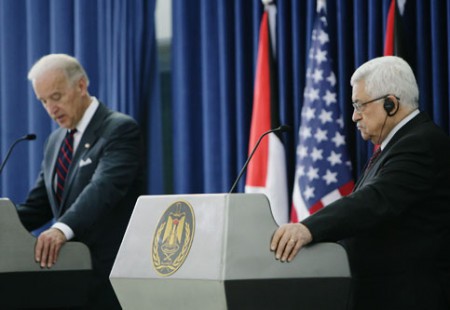
At last September’s New York summit with Israeli Prime Minister Benjamin Netanyahu and Fatah leader Mahmoud Abbas, US President Barack Obama publicly abandoned his demand that Israel halt construction of colonies in the occupied West Bank as a precursor to the resumption of US-brokered negotiations. Thus, Obama humiliatingly signaled the collapse of his much-hyped peace effort.
Since then, Obama’s envoy, George Mitchell, has been shuttling about looking for a face-saving formula to make it seem as if there were still a “peace process” that might one day result in a two-state solution.
After months of effort, the US managed to bludgeon and cajole Abbas and certain “moderate” Arab states into backing “indirect talks” between Israel and Abbas, even as Israel escalates its ethnic cleansing of Jerusalem, its colonization of the West Bank, its blockade of Gaza and its daily rounds of murders and kidnappings of Palestinians throughout the occupied territories. Even this meager achievement seemed in doubt after Netanyahu’s government brazenly announced an additional 1,600 Jewish-only homes during a visit to Israel by US Vice President Joe Biden.
There is no doubt that the Obama Administration will press on with the charade of negotiations no matter what. The alternative would be to actually use the massive US subsidies Israel receives to tame its rogue behavior. But Obama, before and after entering office, never showed the slightest inclination to do that (despite naïve and inflated expectations across the Arab world and within peace process industry circles), and will not do so now as his vulnerable Democratic Party heads for midterm elections with virtually no achievements to present to voters.
Amid this dismal situation, comes a new paper by Saeb Erekat, senior aide to Abbas, and “chief negotiator” for the US-backed Ramallah Palestinian Authority (PA).
The 7,000-plus word document, produced by the Negotiations Affairs Department of the Palestine Liberation Organization (NAD-PLO), is clumsily titled “The Political Situation in Light of Developments with the US Administration and Israeli Government and Hamas’ Continued Coup d’etat: Recommendations and options.” (NAD-PLO is actually administered by the Adam Smith Institute, “the UK’s leading free market think tank,” and funded entirely by Western governments.)
Dated December 2009, the paper was reported on in several Israeli newspapers in mid-February, and distributed to European and other diplomats as a warning that the Palestinians had options other than continuing with futile negotiations. They could, for example, abandon the two-state solution and call for one state, it warns. However, a close reading reveals a different picture.
The paper is very poorly-written, repetitive and at times barely coherent. One passage reads: “Accreditation papers cannot be presented to the US Administration and to others without the Palestinian paper. These issues bear a significant link with the forcible take-over of the Gaza Strip, which cannot be construed except by accurately understanding regional developments and how to present accreditation papers.” There is much more of this jumbled, and seemingly nonsensical language — all those governments should wonder what their money is really buying!
Nevertheless, a key concern does emerge: Erekat is very worried that the US will pressure Abbas to resume negotiations from scratch, instead of from the point at which they ended in December 2008 with the previous Israeli government headed by Ehud Olmert. Indeed, the paper makes this precise demand no fewer than 15 times, warning that failure to start from that point would make Palestinians vulnerable to “Netanyahu’s vision” which would mean Palestinians “will be obliged to accept Israeli positions” particularly its refusal to negotiate about Jerusalem, “as well as recognize Israel as a Jewish state.” The paper warns that “The file of refugees will be excluded from negotiations and Palestinians [would] need to agree that Israel preserve control over Palestinian border crossings and aerial space.”
Only starting from the point reached in December 2008, it would seem, could stave off such a disaster! But in fact, the paper lays out in detail what was supposedly agreed by December 2008 and it is clear that on all the key issues the Abbas leadership had already conceded to Israel’s demands in principle and in practice.
Abbas had offered (and Israel had rejected) that only 15,000 refugees per year return to the lands from which they were ethnically cleansed in what is now Israel, for a period of ten years. This effectively cancels the right of return, and acts as a de facto recognition of Israel’s “right to exist as a Jewish state” by conceding that its racist exclusion of non-Jewish Palestinians trumps the refugees’ human right to go home.
Moreover, the Erekat paper makes no mention whatsoever of the “right of return” — a fundamental consensus demand of Palestinians inside the country and in the diaspora — but refers vaguely to a “just and agreed solution in accordance with UN [General Assembly Resolution] 194.” It does not call for implementation of the resolution — which demands that any refugee who wishes to do so be allowed home “at the earliest practicable date.” Needless to say, what Israel considers “just” and would agree to is completely at odds with Palestinian rights and international law. Indeed, Olmert had offered the return of 1,000 refugees per year for five years — or about one tenth of one percent of all refugees.
As far as territory is concerned, the paper reveals that Abbas conceded Israeli demands to annex large settlement blocs all over Jerusalem and across the West Bank. Once this concession is made, all the bluster about the “1967 border” being a sacred line behind which Israel must withdraw becomes meaningless.
While not conceding a “demilitarized state” by name, Abbas apparently offered that the “sovereign” Palestinian state “would have the right to possess the weapons necessary for the full assumption of its responsibilities” but only “in cooperation with [a] third party.” This third party is not named, but this is almost certainly a reference to the United States, which has since the George W. Bush Administration armed and trained PA militias under the supervision of Lt. Gen. Keith Dayton to go out and hunt Palestinians who resist the occupation; US officials have often stated that these repressive militias are to be the nucleus of the armed forces of the future Palestinian state.
Given that the purpose of negotiations is presumably to reach an outcome that lies somewhere between the starting positions of both parties, it is horrifying to think that these proposals are Abbas’ and Erekat’s starting positions. Even if Israel were to grant them, which it clearly will not in any US-brokered process, the end result would be a Palestinian pseudo-state: a bantustan. It would not be a state that fulfills Palestinian rights, but exists in order to deny them, particularly the right of return.
The incoherence of this approach is further highlighted by the fact that the paper accuses the Obama Administration of first promising Abbas that any negotiations would restart from the December 2008 point, and then abandoning that promise. Yet despite the apparent betrayal on this issue and the settlement freeze, the Erekat paper still proposes that the Palestinians “[u]rge the US to propose principles for the resolution of all core, final status issues (borders, settlements, Jerusalem, refugees, security, water, prisoners) …”!
This addiction to always-broken American promises recalls the iconic episode in the Peanuts comic strip where Charlie Brown repeatedly runs to kick a ball held in place by Lucy; each time, Lucy pulls the ball away at the last second leaving Charlie Brown to fall flat on his back. And each time, Charlie Brown believes Lucy’s renewed promises that the next time she will hold the ball in place.
The Erekat paper provides insight into the thought processes of a “leadership” that has not only lost all legitimacy, but does not dare to even to speak about the rights of the people it purports to represent. Indeed, it holds those people and their rights in utter contempt.
While appealing for “national unity,” the paper continues to propagate the false story of a Hamas “coup” in Gaza (in fact the Abbas leadership through its warlord Muhammad Dahlan had tried, ever since Hamas won elections in 2006, to launch a civil war to violently overthrow the group as part of a scheme conceived and executed in collaboration with then US Secretary of State Condoleezza Rice and approved by President Bush — see David Rose, “The Gaza Bombshell,” Vanity Fair, April 2008).
Apparently aware of the utter lack of credibility that the Ramallah Palestinian Authority and the Abbas-controlled skeleton of the PLO have, the Erekat paper proposes a sort of PA hasbara campaign among the Palestinian diaspora in Europe, the Americas and Asia, “to confirm the unified and legitimate representation by the Palestine Liberation Organization (PLO) wherever they are.” This strategy, to be conducted by the “PLO Expatriates Affairs Department” (as if Palestinians are merely emigrés and not refugees), the “Palestinian Ministry of Foreign Affairs” and Fatah itself is aimed to “protect the question of Palestine from attempts targeting the promotion of division, separation and fragmentation and finding an alternative for the PLO by manipulating resistance and religion.”
In other words, the Abbas leadership wants to export its civil war to the diaspora. Indeed, we have already seen this effort begin with the attempted launch of the Abbas-controlled “Palestine Network” aimed to divide and co-opt Palestinian activists (“USPCN: ‘Palestine Network’ is a PA Attempt to Divide the Palestinian People and Surrender their Rights,” 20 November 2009).
Nowhere of course does the Erekat paper actually propose reviving and democratizing the PLO and really involving Palestinians whose voices have been so long shut out by the corrupt and oppressive Oslo clique. It does not recognize or mention the growing civil society-led campaign for boycott, divestment and sanctions (which scares Israel much more than Erekat’s barking), and mentions the one-state solution only in passing without acknowledging the serious work that has already been done to develop and disseminate this idea.
This is not surprising; to acknowledge any of that would be to admit that the fiction of US-brokered negotiations is over, that those who acted in it and benefitted from it for so long have already done all the damage they can do to the Palestinian people and their rights, and that they should leave the stage.
US and Israel dodge settlement confrontation: BBC
Mr Netanyahu gave Mr Biden a framed certificate, but broke the glass before handing it over
By Paul Wood
During the vice-president’s visit, Benjamin Netanyahu presented Joe Biden with a framed certificate but managed to lean on it, shattering the glass.
One Israeli newspaper had a cartoon showing an Israeli settler with a leaf-blower, blasting the shattered glass into Mr Biden’s face.
The settler was presumably from Ramat Shlomo, where Israel has just announced it would be building 1,600 new homes on occupied land.
The Americans weren’t buying Israel’s explanation that this was the result of a slow-moving bureaucratic process which caught Mr Netanyahu and other senior officials unawares.
Immediately following the announcement, the vice president kept the Israeli prime minister waiting 90 minutes for an official dinner.
That was taken as a sign of Mr Biden’s displeasure.
It also reflected the time needed to work out the line to take with President Barack Obama about the settlement issue.
In the end, the Americans seem to have acquiesced in a face-saving formula drawn up by Mr Netanyahu.
Warm speech
This says procedures will be put in place so that in future such announcements are not made at sensitive junctures in the peace process.
It also states that building at Ramat Shlomo will not start for several years.
In his speech in Tel Aviv, Mr Biden seized on this to say that negotiations should start immediately – there would be time later to work issues such as Ramat Shlomo (along with the division of Jerusalem, control of the holy sites, what is to happen to Palestinian refugees and the final borders between Israel and a future Palestinian state).
Mr Biden used his speech to reiterate yesterday’s unequivocal condemnation of the Israeli decision to build these 1,600 new homes on occupied land.
He said it undermined the trust needed for negotiations to succeed. But the speech was nevertheless warm and non-confrontational.
Indeed Mr Biden began it by saying that he had been a friend and supporter of Israel’s for the past 37 years as an elected public official.
‘Don’t bomb Iran’
Part of Mr Biden’s speech was aimed at Israel’s fears over Iran
Some Israeli commentators have raised the question of whether the United States will be able to fully trust Israel over the sensitive and vital issue of how to deal with Iran if Israel was prepared to humiliate Mr Biden over the settlements issue.
To dispel such thoughts, the vice-president attempted to reassure Israelis that they would not have to face what they assume to be an Iranian nuclear threat alone.
He did however plead for sanctions and diplomacy to be given a chance to work before any military action.
A big part of his private discussions with Israeli leaders is thought to have been about delivering the message: don’t bomb Iran.
Mr Biden’s visit was about resuscitating a peace process which doesn’t seem to have much life of its own – indeed one key part of his speech in Tel Aviv was to tell both parties to the conflict that the United States could not want peace more than they did.
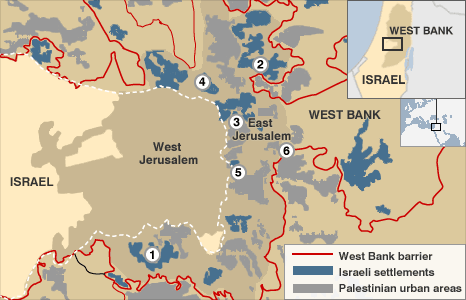
Talks in doubt
So it seems that the White House had decided to try to avoid another damaging and protracted tussle with the Israeli prime minister about settlements.
After all, Israel came out on top in the last test of wills, agreeing to something far less than the total settlement freeze that Washington – and the Palestinians – had been demanding.
All this leaves the Palestinians in a very difficult position.
1 Gilo: 850 homes approved for publication and planning objections in Nov 2009
2 Pisgat Zeev: 600 homes approved for publication and planning objections in Jan 2010
3 Sheikh Jarrah: Several Palestinian families evicted in past 18 months to make way for Jewish settlers after court ruled in ownership dispute
4 Ramat Shlomo: 1,600 homes approved for publication and planning objections in Mar 2010
5 Silwan: Demolition orders on 88 Palestinian homes built without difficult-to-get permits – Israel planning controversial renewal project
6. West Bank barrier: Making Palestinian movement between West Bank and Jerusalem harder – Israel says it’s for security
Backed by the Arab League, they have said that it will be very difficult for them to enter indirect talks unless the Ramat Shlomo project is cancelled.
Yesterday, they were feeling pretty pleased that Israel was at odds with its main ally.
Now the Palestinians must decide if they will go along with the formula adopted by Mr Netanyahu.
For the time being then, the much-delayed peace talks remain in doubt.
UN humanitarian chief warns of disaster if Gaza siege continues: Haaretz
The United Nations humanitarian chief warned Thursday of an impending humanitarian disaster if Egypt succeeds in blocking the tunnels that pass under it’s border into the Gaza Strip.
John Holmes said that as bad as the hundreds of tunnels that bypass the
Israeli blockade are, Gaza would have difficulty surviving if Egypt succeeds in blocking them because they are a conduit for badly-needed food, medicine and commercial goods.
He repeated calls for Israel to end its blockade of the Palestinian territory.
“If those tunnels were blocked, however undesirable they may be, and however undesirable the effect they’re having on the Gazan society and Gazan economy, the situation without the tunnels would be completely unsustainable,” said Holmes, who visited the region for four days earlier this month.
The tunnels are also widely believed to be used for smuggling cash and weapons to Hamas, which wrested control of Gaza from the Palestinian Authority in 2005 and refuses to recognize Israel. The Israeli government has repeatedly tried to shut the tunnels down.
Egypt has a fence along Gaza’s southern border and is reinforcing the area with underground metal plates to try to block the tunnels. Egypt’s President Hosni Mubarak has defended the move as necessary for his nation’s security following a series of terrorist attacks on nearby tourist resorts.
Holmes said it was very frustrating to see that there has been almost no
rebuilding in Gaza, as a result of the Israeli blockade, since the three-week conflict that ended in Jan. 2009, leaving 13 Israelis and almost 1,400 Palestinians dead.
“What people in Gaza want to see is the opening of the crossings … not only for goods but for people because they are living … in a large open-air prison,” Holmes said.
Holmes said the blockade is not helping Israel’s security or weakening Hamas’ hold on the Palestinian territory.
“The blockade of Gaza does not serve any purpose in my view in security terms for Israel because anything can come in through those tunnels at the moment, nor is it weakening the hold of Hamas on Gaza,” he said. “That’s perfectly clear when you’re there.”
Israel has linked the release of Israeli soldier Gilad Shalit, who was captured by Palestinian militants in 2006 and is being held by Hamas, to the blockade, saying it will not consider easing the embargo until Shalit is home. Holmes said the United Nations has called for the release of Shalit and urged that he be treated in accordance with the Geneva conventions.
“But the link between that and the fate of the 1.5 million Palestinians in Gaza does not seem to us a reasonable one,” he said
